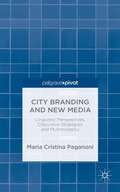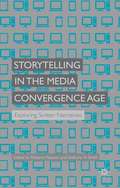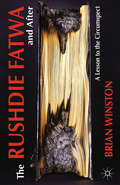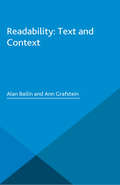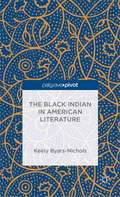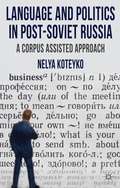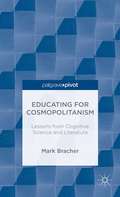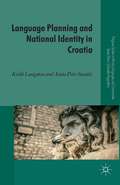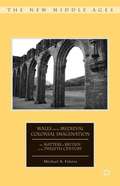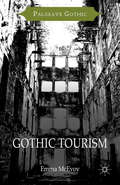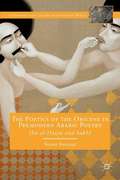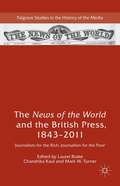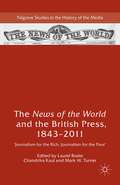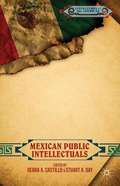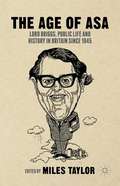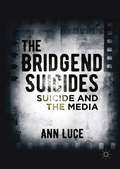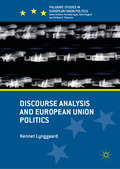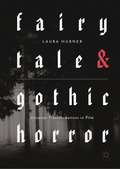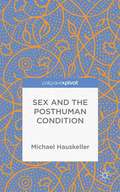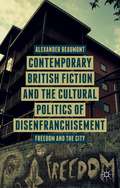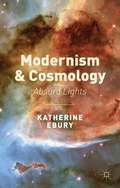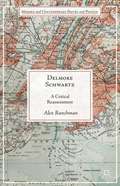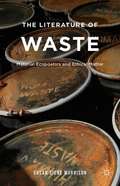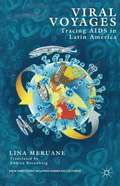- Table View
- List View
City Branding and New Media: Linguistic Perspectives, Discursive Strategies and Multimodality
by Maria Cristina PaganoniThis book explores city branding in the public sector as an aspect of e-governance from a privileged linguistic, discursive and semiotic perspective. It analyses how local administrations and public bodies engage their stakeholders by addressing key issues such as active citizenship, social inclusion and promotion of cultural heritage and events.
Storytelling in the Media Convergence Age
by Roberta Pearson Anthony N. SmithThis collection investigates the relationship between contemporary screen narratives and their varied contexts of production, circulation and reception, exploring storytelling practices across a range of different media and national and institutional sites. While convergence and globalisation blur the boundaries between media and nations, it is still vital to account for the persistent national, medium, institutional and technological specificities that give rise to different narrative forms. The chapters study the ways in which these factors shape events, characters and settings; inform modes of narrative presentation; influence, via paratextual surround, potential interpretations; and accord certain stories more value than others. The authors use case studies drawn from a range of media, from Hollywood franchises to digital comics, and a range of countries, from United States to Japan. In connecting contemporary screen media narratives to their contexts, this book offers a new perspective on recent transformations in screen media culture.
The Rushdie Fatwa and After
by Brian WinstonThis resounding defence of the principles of free expression revisits the Satanic Verses uproar of 1989, as well as subsequent incidents such as the Danish cartoons controversy, to argue that the human right of free speech is by no means so secure that it can be taken for granted.
Readability: Text and Context
by Ann Grafstein Alan BailinThis book explores what makes a book readable by bringing together the relevant literature and theories, and situating them within a unified account. It provides a single resource that offers a principled discussion of the issues and their applications.
The Black Indian in American Literature
by Keely Byars-NicholsThe first book-length study of the figure of the black Indian in American Literature, this project explores themes of nation, culture, and performativity. Moving from the Post-Independence period to the Contemporary era, Byars-Nichols re-centers a marginalized group challenges stereotypes and conventional ways of thinking about race and culture.
Gothic Science Fiction
by Sian MacarthurGothic Science Fiction is a comprehensive account of the rise of a fascinating genre that has grown out of the Gothic. From the dark and mysterious world of mad scientists to the horrors and terrors associated with monsters and aliens, Sian MacArthur takes the reader through a madcap journey to identify those features of the Gothic that have influenced and continue to influence the world of science fiction. From Frankenstein to Doctor Who and from H. G Wells to Stephen King, the book explores several aspects, beginning with Mary Shelley and bringing the subject matter right up to date with the inclusion of works by Justin Cronin and Daniel Wilson. Gothic Science Fiction gives the crazy and always interesting world of Gothic science fiction detailed attention in an account that is both accessible and engaging.
Language and Politics in Post-Soviet Russia
by Nelya KoteykoLanguage and Politics in Post-Soviet Russia critically examines the uses of language in post-Soviet media and political texts between 1998 and 2007. It will be of interest to academics and researchers in the fields of media studies, discourse analysis, corpus linguistics, and scholars in Russian Studies.
Educating for Cosmopolitanism: Lessons from Cognitive Science and Literature
by Mark BracherDrawing on developments in cognitive science, Bracher formulates pedagogical strategies for teaching literature in ways that develop students' cognitive capabilities for cosmopolitanism, the pursuit of global equality and justice. Several staple classroom texts, such as Things Fall Apart, provide detailed examples for teaching practices.
Language Planning and National Identity in Croatia (Palgrave Studies in Minority Languages and Communities)
by K. Langston A. Peti-StanticFollowing the collapse of the former Yugoslavia, Croatian was declared to be a separate language, distinct from Serbian, and linguistic issues became highly politicized. This book examines the changing status and norms of the Croatian language and its relationship to Croatian national identity, focusing on the period after Croatian independence.
Wales and the Medieval Colonial Imagination
by Michael A. FaletraFocusing on works by some of the major literary figures of the period, Faletra argues that the legendary history of Britain that flourished in medieval chronicles and Arthurian romances traces its origins to twelfth-century Anglo-Norman colonial interest in Wales and the Welsh.
Gothic Tourism: Constructing Haunted England (Palgrave Gothic)
by Emma McEvoyFrom Strawberry Hill to The Dungeons, Alnwick Castle to Barnageddon, Gothic tourism is a fascinating, and sometimes controversial, area. This lively study considers Gothic tourism's aesthetics and origins, as well as its relationship with literature, film, folklore, heritage management, arts programming and the 'edutainment' business.
The Poetics of the Obscene in Premodern Arabic Poetry
by Sinan AntoonThe book is the first study of the 10th century Iraqi poet Ibn al-Hajjaj who popularized a new genre of obscene and scatological parody (sukhf) and is considered the most obscene poet in Arabic literature. Antoon traces the genealogy of this fascinating genre in and examines its rise by placing it in its sociopolitical context.
The News of the World and the British Press, 1843–2011: 'journalism for the Rich, Journalism for the Poor' (Palgrave Studies in the History of the Media)
by Chandrika Kaul Mark W. Turner Laurel BrakeThe News of the World and the British Press, 1843–2011.
The News of the World and the British Press, 1843-2011: 'Journalism for the Rich, Journalism for the Poor' (Palgrave Studies in the History of the Media)
by Laurel Brake Chandrika Kaul Mark W. TurnerThis volume is the first scholarly treatment of the News of the World from news-rich broadsheet to sensational tabloid. Contributors uncover new facts and discuss a range of topics including Sunday journalism, gender, crime, empire, political cartoons, the mass market, investigative techniques and the Leveson Inquiry.
Mexican Public Intellectuals
by Debra A. Castillo Stuart A. DayIn Mexico, the participation of intellectuals in public life has always been extraordinary, and for many the price can be high. Highlighting prominent figures that have made incursions into issues such as elections, human rights, foreign policy, and the drug war, this volume paints a picture of the ever-changing context of Mexican intellectualism.
The Age of Asa
by Miles TaylorAsa Briggs has been a prominent figure in post-war cultural life - as a pioneering historian, a far-sighted educational reformer, and a sensitive chronicler of the way in which broadcasting and communication more generally have shaped modern society. He has also been a devoted servant of the public good, involved in many inquiries, boards and trusts. Yet few accounts of public life in Britain since the Second World War include a discussion or appreciation of his influential role. This collection of essays provides the first critical assessment of Asa Briggs' career, using fresh research and new perspectives to analyse his contribution and impact on scholarship, the expansion of higher education at home and overseas, and his support and leadership for the arts and media more generally. The online bibliography of Asa Briggs' publications which accompanies the book is available on the The Institute of Historical Research website here.
The Bridgend Suicides
by Ann LuceThis in depth analysis looks at how suicide was represented in the British press when 20 young people between the ages of 15 and 29 took their own lives in the South Wales Borough of Bridgend in 2008. The chapters highlight specific categories of description that journalists use to explain suicide to their readers. The study also examines the discourses that emerged around suicide that continue to perpetuate stigma and shame when suicide occurs today. Using her own experience of having lost a loved one to suicide, coupled with original research, the author gives a very frank explanation of why suicide is not accepted in society today.
Discourse Analysis and European Union Politics (Palgrave Studies in European Union Politics)
by Kennet LynggaardThis book reflects on the latest developments in discourse analysis in the context of EU politics research. It explores discourse analysis as a tool to study and understand EU politics, covering key conceptual, methodological and research-strategic questions. The analytical approach advanced in this book is anchored in discursive institutionalism, the newest addition to approaches in new institutionalism. The author particularly focuses on discourse as a strategic resource for political purposes, as a device for inclusion and exclusion in policy-making, and as a means of conveying and appealing to political emotions, as well as the role visual discourse and imagery play in day-to-day EU politics. Including a variety of examples using different combinations of research techniques and data material, the book also addresses issues related to the study of discursive structures and agency, discourse conflict and consensus, causality and the time dimension in discourse analysis.
Fairytale and Gothic Horror: Uncanny Transformations in Film
by Laura HubnerThis book explores the idiosyncratic effects generated as fairytale and gothic horror join, clash or merge in cinema. Identifying long-held traditions that have inspired this topical phenomenon, the book features close analysis of classical through to contemporary films. It begins by tracing fairytale and gothic origins and evolutions, examining the diverse ways these have been embraced and developed by cinema horror. It moves on to investigate films close up, locating fairytale horror, motifs and themes and a distinctively cinematic gothic horror. At the book’s core are recurring concerns including: the boundaries of the human; rational and irrational forces; fears and dreams; ‘the uncanny’ and transitions between the wilds and civilization. While chronology shapes the book, it is thematically driven, with an interest in the cultural and political functions of fairytale and gothic horror, and the levels of transgression or social conformity at the heart of the films.
Sex and the Posthuman Condition
by Michael HauskellerThis book looks at how sexuality is framed in enhancement scenarios and how descriptions of the resulting posthuman future are informed by mythological, historical and literary paradigms. It examines the glorious sex life we will allegedly enjoy due to greater control of our emotions, improved capacity for pleasure, and availability of sex robots.
Contemporary British Fiction and the Cultural Politics of Disenfranchisement
by Alexander BeaumontDuring the 1980s, urban space became an important battleground in a confrontation between left and right over the meaning of freedom. While Thatcherism sought to harness the power of the free market to rationalise and reform the inner cities, the response of the 'cultural' left was to celebrate the emancipatory potential of flexible identities and expressive practices associated with urban subcultures. However, through close readings of eight contemporary authors, this book argues that a problematic consequence of the left's experiment with freedom was to elevate exclusion to the status of a political principle and to close down the space of politics itself. It explores how, in less than two decades, the coexistence of flexible cultural identities and urban space has become a virtual impossibility in British fiction. And it suggests that, today, the British novel is frequently marked by structures of failed utopianism, frustrated or incomplete experiments and even withdrawal and quietism, all of which are a consequence of the left's celebration of a cultural politics of disenfranchisement.
Modernism and Cosmology
by Katherine EburyThrough examining the work of W. B. Yeats, James Joyce, and Samuel Beckett, Katherine Ebury shows cosmology had a considerable impact on modernist creative strategies, developing alternative reading models of difficult texts such as Finnegans Wake and 'The Trilogy'.
Delmore Schwartz
by Alex RunchmanTaking as its starting point Delmore Schwartz's self-appointment as both a 'poet of the Hudson River' and 'laureate of the Atlantic, ' this book comprehensively reassesses the poetic achievement of a critically neglected writer. Runchman reads Schwartz's poetry from In Dreams Begin Responsibilities to the posthumously-published Last & Lost Poems in relation to its national and international perspectives, recognizing tensions between the two but arguing that these more often animate his writing than hold it back. Addressing Schwartz's Jewish-American heritage, his attempts to negotiate the influence of T. S. Eliot, his use of allusion, his writing about the city, his responses to World War II, and his later poetry's euphonic symbolism, Delmore Schwartz: A Critical Reassessment reestablishes Schwartz's importance to his peers and successors. "
The Literature of Waste
by Susan Signe MorrisonTracing material and metaphoric waste through the Western canon, ranging from Beowulf to Samuel Beckett, Susan Morrison disrupts traditional perceptions of waste to better understand how we theorize, manage, and are implicated in what is discarded and seen as garbage. Engaging a wide range of disciplines, Morrison addresses how the materiality of waste has been sedimented into a variety of toxic metaphors. The vibrancy of matter itself disturbs these metaphors, especially those used to characterize people as disposable garbage. If scholars can read waste as possessing dynamic agency, how might that change the ethics of refuse-ing and ostracizing wasted humans? A major contribution to the growing field of Waste Studies, this comparative and theoretically innovative book confronts the reader with the ethical urgency present in waste literature itself.
Viral Voyages
by Lina Meruane Andrea RosenbergThis is the first book to comprehensively examine Latin America's literary response to the deadly HIV virus. Proposing a bio-political reading of AIDs in the neoliberal era, Lina Meruane examines how literary representations of AIDS enter into larger discussions of community, sexuality, nation, displacement and globalization.
